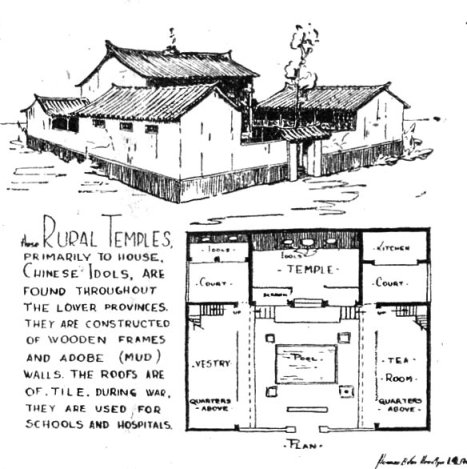
 OR THE ORGANIZATIONAL YEAR which ends 10 March, the Fourteenth Air Force has destroyed more than 1,200 enemy planes,
more than 500 of them were shot down in air combat. These figures do not include more than 190 probables nor the
hundreds damaged in air combat, nor the probables and damaged left by our bombers and fighters on burning enemy
airdromes.
OR THE ORGANIZATIONAL YEAR which ends 10 March, the Fourteenth Air Force has destroyed more than 1,200 enemy planes,
more than 500 of them were shot down in air combat. These figures do not include more than 190 probables nor the
hundreds damaged in air combat, nor the probables and damaged left by our bombers and fighters on burning enemy
airdromes.
In destruction of enemy aircraft, as in the destruction of enemy installations and supply lines, our missions have been invariably outnumbered by enemy air strength. But through surprise and combat proficency we have destroyed more than eight enemy planes in air combat for every plane of ours that he has shot down. Fighters and bombers of the Fourteenth Air Force since March 1944 have sunk nearly 600,000 tons of enemy shipping, with 270,000 additional tons probably sunk and nearly 450,000 tons damaged. This is a total of more than 1,300,000 tons. At least 18 enemy naval vessels not included in the tonnage totals were destroyed by our fighters and bombers, 14 were probably destroyed and 18 were damaged. During the year we destroyed more than 2,600 smaller craft on which the enemy depends so greatly for supply lines on the coast and in th occupied river valleys of interior China. More than 300 of the craft in this category were probably destroyed and more than 9,000 damaged. Since June, units of the Fourteenth Air Force have killed more than 30,000 enemy troops and nearly 10,000 troop horses and pack horses. More than 700 enemy locomotives have been destroyed and 450 have been damaged. We have knocked out more than 100 bridges on enemy lines of communication and we have damaged nearly 250. As modern air forces go, all this has been done by few with little, often under extremely adverse weather conditions and over the world's most unfavorable terrain. It has been made possible by incredibly more pilot and crew sorties per month than might be expected, and by indefatigable effort and devotion to duty on the part of ground personnel supporting the operations. Not least among the accomplishments of the Fourteenth Air Force in its second year was the protection of more than two million Chinese refugees evacuating areas of Central and South China. For the first time since the Japanese attacked China, hundreds of thousands moved under the sheltering wings of the Fourteenth Air Force, ahead of the Japanese armies, free from wanton strafing and bombing, aided by our surgeons and flight nurses. Fourteenth Air Force transport units and attached combat cargo squadrons have dropped thousands of tons of supplies and munitions to Chinese armies operating against the enemy, and have transported across enemy lines supplies essential to the operations of advanced bases. Repeatedly, in co-operation with the China Air Service Command and the Engineers, they have completed the evacuation of our bases without material loss to our arms or gain to the enemy. It is notable in this connection that the enemy has thus far been unable to capitalize the bases we have evacuated under pressure of his ground forces. In sharp contrast, we have made untenable many of the formerly significant Japanese air bases in China and have widely extended our zones of air supremacy and air superiority against a repeatedly surprised and always reluctant enemy. Many times outnumbered, we have beaten him to the ground. He no longer dares attack in the daylight hours, and his air strength is waning on all our fronts.
|
Chinese SOS Truckers Will 'Keep 'em Rolling' For China
KUNMING - Transportation is one of the important elements in the problem of supplying Chinese forces fighting the Japanese in western China.
This fact is emphasized in plans for the new Chinese Army Services of Supply on which an integrated staff of American and Chinese officers is now at work, which call for important expansion of transportation facilities behind the Chinese armies.
The new Chinese SOS has headquarters here and works closely with Chinese Army headquarters under General Ho Ying-chin and with the Services of Supply, U.S. Forces, commanded by Maj. Gen. G. X. Cheves.
New trucks now coming over the Stilwell Road will be operated principally by Chinese Motor Regiments being organized and trained by American instructors in India and China. These Chinese units will move most of the tonnage required for the support of Chinese armies.
"For each American soldier brought into China," declared Col. C. C. Benson, Washington, D.C. Transportation Officer, SOS, USF, "about one third of a ton of supplies a month has to be air-lifted over the 'Hump' or brought in by truck more than 1,000 miles from Ledo.
"Every additional American soldier that we bring into China must be carefully weighed against the needs of the 14th Air Force for fuel and the needs of the Chinese armies for arms and ammunition.
"Chinese truck drivers and mechanics live in their own country, eat home-grown food and wear clothing produced in China. They are patient, hard-working and eager to learn all we can teach them about American trucks and American maintenance and repair practices.
"A year and a half experience training Chinese tank units in India has convinced me that Chinese truck and maintenance units, given reasonable training, can and will do a good job, long before we can afford to import additional American troops for SOS duties in China. I confidently expect to see well-trained Chinese units doing most of the work."
The tonnage now moved in for support of American forces is not up to standards for many other theaters. Men frequently make sacrifices on convenience and comfort items for tonnage put to fighting needs. Often soldiers get only two cartons of cigarettes in a month, light as they are in weight. Much soldier food is grown in China. Some candy is manufactured in China to save precious hump tonnage.
ATC Chief Lauds SOS 'Hump' Help
The splendid co-operation that the Ground and the Air Forces bring to bear against the enemy in the China Theater was again illustrated this week in a letter from Brig. Gen. William H. Tunner, commanding general, ICD-ATC, to the office of Lt. Gen. A. C. Wedemeyer, commanding general of the China Theater.
In his letter, Gen. Tunner announced that the ATC, during the month of January, had air-lifted more tonnage to China than ever before in its history, and added:
"This record could not have been achieved without the co-operation and sincere efforts displayed by certain other agencies. The assistance which the Services of Supply in the China Theater has rendered has been of inestimatable value in the successful accomplishment of the mission of this Division.
"I would be grateful if you would convey to all concerned the appreciation of the India-China Division for all the help given to this Command."
In an indorsement to Gen. Tunner's letter, Brig. Gen. Mervin E. Gross, acting Chief of Staff, China Theater, added:
"The Commanding General wishes to express his appreciation to the officers and men (of the SOS) for the splendid co-operation you have extended to the India-China Division of the Air Transport Command in handling air-lift tonnage for the China Theater."
Race For Time Now Favors Chinese; Jap Hopes Fading
CHUNGKING, March 8 - China's 8-year-old policy of trading space for time in the war against Japan has at last begun to show results favorable to China. The race for time is now beginning to run in favor of the armies of Chiang Kai-shek and against the Japanese.
If the Japanese intend to wage a long war on the Asiatic mainland, they must neutralize all Chinese resistance in their rear. But if they hope to knock China out of the war they must move fast.
With their homeland under attack, Americans successfully landed on Iwo Jima, the Philippines cleared up far ahead of schedule, a land route opened into western China, and every Jap-held coastal point in China threatened by possible landings from the sea, the time factor is now heavily against the Japanese and on the side of the Chinese.
China's preparations for a major counter-offensive are reported to be moving so satisfactorily that her military leaders feel it may start earlier than originally planned.
During recent months the Chinese have yielded no major land area to the enemy, they have successfully harassed his communications lines, they exacted a toll of 7,400 verified enemy casualties in battles along the Hunan-Kwangtung border, and they have made new contact with guerilla forces in occupied territory and equipped and supplied them.
The military situation in China may be summed up as a race for time - between the day when the Japanese feel secure enough in their defenses against sea landings to attempt a knock-out clow against China, and the day when the Chinese start their counter-offensive.
According to a Chinese Army Intelligence report, General Okayama, the Japanese commander in China, has asked Tokyo for authorization to launch an all-out offensive against China. While Chinese leaders here do not rule out the possibility of such a Japanese offensive, they feel that the enemy cannot muster the necessary strength for it because of the threats to his homeland and the China coast.
A military spokesman points out that a year or two ago the enemy had a much more favorable opportunity for such a venture, but even then he would have needed "several tens of divisions."
Meanwhile, in the time available to them the Chinese are rushing reforms to improve their army, they have established a new service of supply for the distribution of large stores piling up at the China end of the land and air routes from India. American training and co-operation are being stepped up, and operations by ground and air forces keep the enemy from exploiting his control of the Canton-Hankow railroad, which he needs for completion of his defensive preparations.
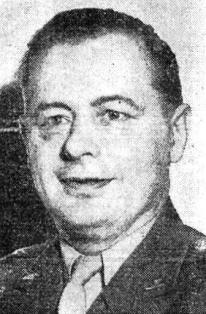 FOURTEENTH CHIEF OF STAFF, Brig. Gen. Albert N. Hegenberger, new Chief of Staff of the Fourteenth Air Force,
succeeds Brig. Gen. Edgar E. Glenn. Previously Gen. Hegenberger was Chief of Staff for the Second Air Force in the
United States.
FOURTEENTH CHIEF OF STAFF, Brig. Gen. Albert N. Hegenberger, new Chief of Staff of the Fourteenth Air Force,
succeeds Brig. Gen. Edgar E. Glenn. Previously Gen. Hegenberger was Chief of Staff for the Second Air Force in the
United States.
|
Stock, Planes, Ships Despite Bad Weather
HQ., 14th AIR FORCE, CHINA - Fighting the dread bug-a-boo of adverse weather, the 14th Air Force scored heavily against the Japanese during the month of February. With 78 enemy aircraft destroyed, five probably destroyed and 98 damaged, enemy aircraft combat losses in ration to combat losses of the 14th Air Force were six to nothing.
Thirteen enemy vessels were sunk with a total tonnage of 30,400; five vessels totaling 11,100 tons were probably sunk and 36 with a total of 36,000 tons were damaged during the month.
A 200 foot gunboat was sunk and two Jap naval vessels were damaged. Not included in any tonnage totals were 67 river craft and other vessels of less than 100 feet sunk, nine probably sunk and 298 damaged.
The score on Japanese locomotives was 149 destroyed and 117 damaged. The 14th Air Force operations during February also accounted for 452 enemy troops and 243 enemy troop horses killed in the same operation.
The heaviest strike of the month was the bullseye scored on the Jap airdrom at Tsing-Tao, on the Shangtung Peninsula, February 10.
Results of February operations brought cumulative totals of the 14th Air Force damage to the enemy to the following figures for the overall period since July 4, 1942:
Two thousand one hundred and ninety four Japanese planes destroyed and more than 1,200 wer shot down in combat.
Four hundred and nine enemy vessels sunk and destroyed representing a total tonnage loss to the Japanese of more than 895,000 tons of shipping at the hands of the 14th Air Force. More than 300 represented by 169 enemy vessels listed as probably sank and nearly 670,000 tons of enemy shipping damaged, totaling a tonnage aggregate in sunk and destroyed, probably sunk and damged of nearly 1,950,000 tons.
Not included in cumulative tonnage categories for the 14th Air Force as of March 1 had destroyed more than 3,000 enemy vessels of less than one hundred feet, had probably destroyed 587 and had damaged more than 10,000.
Thirty two enemy naval vessels had been destroyed, 20 probably destroyed and 31 damaged.
These statistics, it was pointed out, should not be confused with figures released in connection with the second anniversary.
CACW Heaps Havoc On Enemy Shipping
HQ., 14th AIR FORCE, CHINA - Continuing its powerful drive against Japanese transportation facilities in Central and Eastern China, Brig. Gen. Winslow C. Morse's hard-hitting Chinese-American Composite Wing of the 14th Air Force during the month of February destroyed 94 locomotives and 216 trucks.
Composed of both American and Chinese personnel, the Chinese-American Composite Wing has in the past three months wiped out 280 locomotives, probably destroyed seven and damaged 118. During the same period, 163 railroad cars were destroyed, 869 damaged, and 375 trucks destroyed and 556 put temporarily out of action.
The CACW did not restrict its drive to disrupt Japanese transportation to trains and trucks. During December, January and February one gunboat, five steamboats and 116 other boats were blown up, gutted by flames or sent to the bottom, 10 other probably destroyed, and 970 boats of all categories damaged.
The Japanese Air Force was in no way neglected during this three-month period of CACW operations. Thirty-four Japanese aircraft were destroyed in the air and 159 on the ground. An additional 11 were probably destroyed and 148 damaged.
Japanese ground forces were not ignored. In co-operation with Chinese troops during December, January and February, enemy soldiers killed totaled 979. In addition, 1,161 horses were killed.
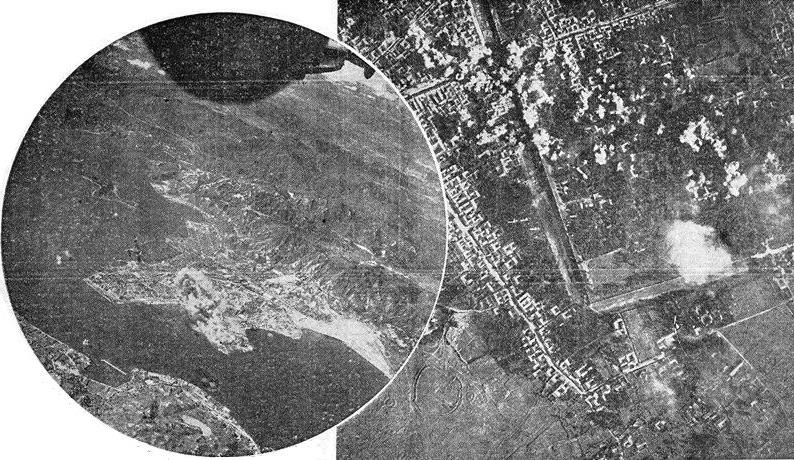
|
| Kowloon Docks, Hong Kong, as it was being struck by Liberators, October 16, 1944. Zero (left center) turns in toward attack bomber. |
| Tengchung, during one of the many raids during July, 1944. Fourteenth Air Force Mitchells breached the walls, making possible the storming of the town by Chinese ground forces. |
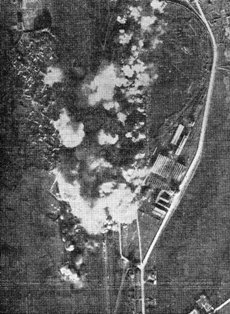 Gia Lam, French Indo-China, marshaling yards struck by Liberators November 27, 1944.
Gia Lam, French Indo-China, marshaling yards struck by Liberators November 27, 1944.
|
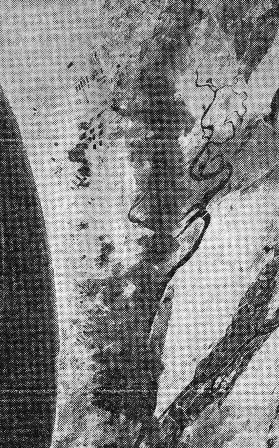 Samah Bay, Hainan Island, struck July 28, 1944
Samah Bay, Hainan Island, struck July 28, 1944
|
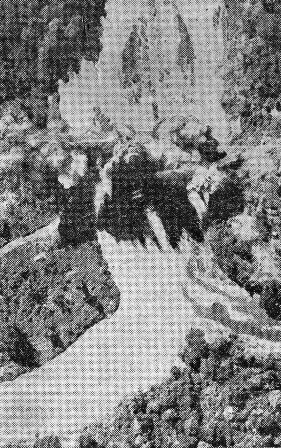 Kenghluang Bridge, on the Menam Yom River, Thailand, hit by Mitchells November 11, 1944.
Kenghluang Bridge, on the Menam Yom River, Thailand, hit by Mitchells November 11, 1944.
|
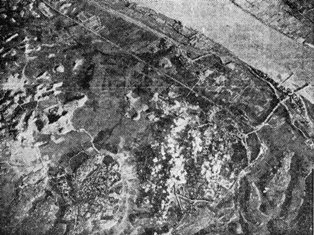 Samshui, on the West River, struck by Fourteenth Air Force on September 14, 1944.
Samshui, on the West River, struck by Fourteenth Air Force on September 14, 1944.
|
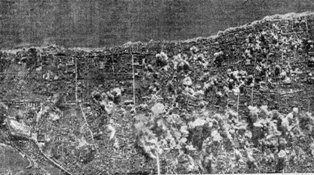 Changsha, hit by Liberators supporting Chinese troops fighting to retake the town after Japs had occupied it a few days earlier.
Changsha, hit by Liberators supporting Chinese troops fighting to retake the town after Japs had occupied it a few days earlier.
|
Pilot Father, Baby Both Doing Well
1340TH AAF BU, CHINA - Capt. Kenneth C. MacGillvray, Flint, Mich., Mobile Squadron's operations officer, had plenty of troubles on his mind when he took off recently on a routine flight to one of the Division's bases in China, what with his wife expecting and communications with "Uncle Sugar" being what they are.
To make matters worse, before he reached his destination, weather conditions which were bad enough when he took off, developed into a storm of gale proportions. Every field within flying radius closed down. Bucking 125 mile head winds, he flew on, hoping a break in the overcast would permit an instrument landing. When his gas began to run low he expected the worst. And the worst did happen when the plane's tanks ran dry, both engines conked out and he and his crew had to bail out.
The 'walk out' was without serious incident. capt. MacGillvray summed it up as follows: "The Chinese were very helpful. They fed us and put us up for the night. The next morning we started to walk. About 20 miles out we were picked up by a unit of the Chinese Combat Command who cared for us till an ambulance arrived to take us away. It was rough going through all those snow drifts and dangerous mountain trails. My chief discomfort, however, came from worrying about my wife's condition."
But it's all over now. Everything is "ding how," with the captain sporting a broad smile and passing out "rain checks" on cigars. For when he reported back to his office, there was a wire on his desk informing him he was the proud father of a 7 pound 5 ounce baby boy.
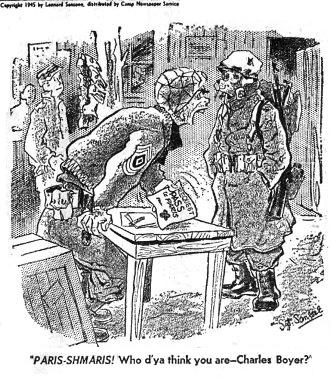
|
Lindell Awarded Silver Star Medal
Capt. Keith G. Lindell, Albuquerque, New Mexico, a fighter pilot of the hard-hitting Chinese-American Composite Wing of the Fourteenth Air Force, was awarded the Silver Star Medal for gallantry in action by Col. T. Alan

|
Capt. Lindell, a graduate of the U.S. Military Academy at West Point, already received the Purple Heart for the same mission. The citation accompanying the award said in part: "He was a pilot of one of the fighter craft that strafed an enemy airdrom in China. Heavy ground fire was sent up by the enemy and on the second run over the target his plane was struck by a shell. It entered the cockpit and exploded, sending shrapnel fragments into his chest and left leg.
"Despite loss of blood and the pain from his wounds he made three additional strafing passes bringing his total of planes destroyed on the ground to four and sharing in the destruction of one enemy plane in the air. On the return trip to his home base he strafed two additional airdromes."
Capt. Lindell came overseas in July, 1943, and has successfully completed 60 combat missions.
Pilot Acquitted of Manslaughter
KUNMING (ANS) - A thirty-one-year-old lieutenant colonel commander of a fighter group and veteran of 80 air missions was acquitted Friday by a General Court Martial on a charge that he committed voluntary manslaughter by firing two pistol shots to end the agony of a sergeant gunner pinioned in the burning wreckage of a B-25 bomber.
The court of seven colonels deliberated for a half hour before returning the verdict. The Defense Counsel contended that the defendant acted irrationally under a great emotional strain.
|
AN ADVANCED CHINA AIR BASE - A 'hot pilot" according to the men of the Yellow Scorpions fighter squadron in West China, is their "number two ace," Lt. Lester L. Arasmith, St. Joseph, Mo.
The Scorpions, nicknamed by Tokyo Rose because of their smashing victories in the battle for Burma, are justifiably proud of their veteran commanding officer, Maj. James J. England, Jackson, Tenn., who is among the tops in the field in the China Theater with 10 victories. But when Arasmith joined the outfit recently and calmly proceeded to pile up a record of five victories in only 19 combat missions, the Scorpions suddenly found themselves blessed with a second hero and a new Theater record.
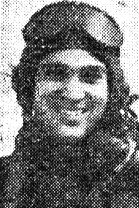
|
And by way of clinching the squadron's long record of world-beating, 20-year-old Arasmith is possibly the youngest "ace" in combat today.
His "baptism of fire" was the huge December Hankow raid. The Mustang fighters hung up an impressive score of victories and dapper pilot Arasmith hung up three all by himself. As he came back over the field, he did a victory roll while his crew chief, S/Sgt. James E. Webb, Lebanon, Tenn., who was anxiuosly "sweating out" his rookie pilot's return on the flight line, puffed up with pride and wiped the perspiration from his brow.
Next on the Arasmith list was an encounter with Japs during a railroad strafing sweep. He and three buddies were jumped by 12 enemy fighters. But even Arasmith can hardly be called foolhardy, so the four Americans made one pass at the Jap formation, shot down three, and went home fast. One of the three belonged to Arasmith.
He scored his fifth Jap, making him an ace, according to World War I standards, as part of a flight of six Mustangs out on a punitive mission. His flight ran into 12 Japs again over Sinsiang in North China. The ensuing dogfight lasted nearly half an hour and the Americans destroyed six of the enemy and damaged four.
The diminutive flyer, who never has been hit, earned a new name after his fifth victory and fourth Jap destroyed on the ground. The name is "Hotshot Charlie," because, according to his brothers in The Scorpions, he's the perfect living image of Milt Caniff's creation bearing the same name in Terry and the Pirates.
G.I. Shakespeare In China . . .
|
Neglected If I ever get the time There's a lot I'd like to do; Several things I left undone, And one I left was you. But I have done some thinkin' Since I went away; I've coined some pretty phrases I'd like to try and say. I've tried, "Bon soir, Cherie," "Bambina, come slu," |
|
But they are vain and can't express Just what my feelings are. What I'd like to really say As best my English can Is, "Darling, look into my eyes; Come let me hold your hand." "Let's go and see the parson, The war is fought and won; So, if I ever leave again, You won't be left undone!!" - T/Sgt. Charles E. Brown |
|
No Doubt The difference between A retreat and a rout - Giving in Before you give out! Stint I don't do this altogether For love of seeing my name in print - Only about ninety percent. - Pfc. David Corn, Jr. |
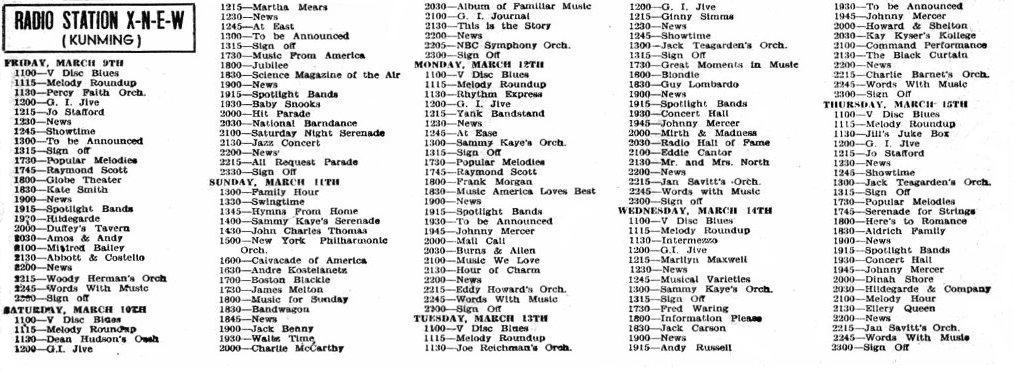
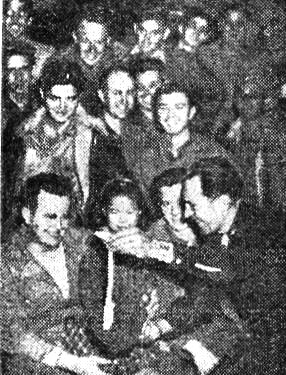 Jack Gwynn produces Chinese rabbit from the hat of Sgt. George Trice, Nashville, Tenn., to the amazement of "Suzy,"
guest of honor in the Unit day room.
Jack Gwynn produces Chinese rabbit from the hat of Sgt. George Trice, Nashville, Tenn., to the amazement of "Suzy,"
guest of honor in the Unit day room.
|
Trouper Jack Gwynn Livens China Scene
1342 AAF BU, CHINA - The indomitable spirit that characterizes showmanship is at it's best when USO trouper Jack Gwynn is on the scene.
Far overdue for a rest, after having covered Italy, North Africa and India with the "Funzafire" unit, Gwynn refused time out to come to China and the end of the line to do his magic for the entertainment-hungry Joes.
Seven shows in 36 hours was the pace Jack set for himself playing in mess halls, hospitals, dayrooms and any available space he can find. When not putting on his act he is in bull sessions with the boys and signing "short snorters." He also has a son who is a pilot in the ETO which probably accounts for his untiring efforts to amaze his many audiences with his bag of tricks.
'Babes In Boyland' To Tour China Theater
Latest of the shows to come to the China Theater is the Entertainment Production Unit's "Babes in Boyland," which is due at APO 627 on March 10, and from there will embark on a tour of all the installations in the theater, it was announced this week by the Theater Special Service office.
This compact six men and a girl unit was especially designed to fit any stage, and features the vocalizing and comedy routines of May Carter, a versatile young comedienne who has been playing before GI audiences throughout the India-Burma Theater for better than two years.
Playing opposite May is Glenn Turnbull, who won acclaim as a dancer in the "Hey Rookie" show, and who recently joined the Entertainment Production Unit. Glenn not only does some hoofing but also sings and handles the male lead in comedy blackouts.
Billed as the "Three Harmoniking's, Hy Dolber, Aage Thompson and Don Prible, supply a musical harmonica background for the vocals in addition to doing a little soloing and vocalizing on their own.
Roland Bellrose, accordionist, and Kenny Golden, bass, round out the unit, doing individual bits and filling out the musical background for the various vocalists.

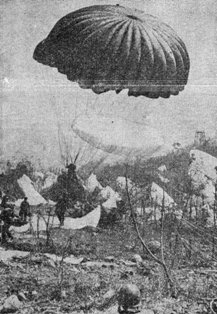 DROPPING IN - Like giant mushrooms, parachutes safely deposit infantrymen on Jap-infested Corregidor to assist
amphibious troops in driving out the enemy. In foreground, with feet just about to touch the ground, Paratrooper
makes a perfect landing on the rocky pinpoint fortress.
DROPPING IN - Like giant mushrooms, parachutes safely deposit infantrymen on Jap-infested Corregidor to assist
amphibious troops in driving out the enemy. In foreground, with feet just about to touch the ground, Paratrooper
makes a perfect landing on the rocky pinpoint fortress.
|
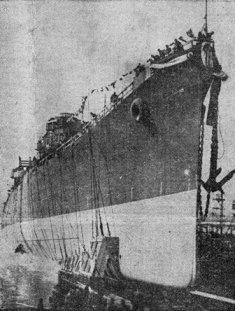 NAVY'S NEWEST light cruiser, USS Fargo, named for North Dakota town, goes down the ways at shipyard
in Camden, N.J. Mrs. Fred Olsen, wife of Fargo City commision president, christened ship.
NAVY'S NEWEST light cruiser, USS Fargo, named for North Dakota town, goes down the ways at shipyard
in Camden, N.J. Mrs. Fred Olsen, wife of Fargo City commision president, christened ship.
|
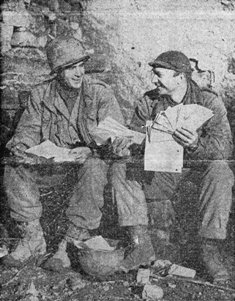 A RED LETTER DAY - Pvt. Morris Gilkerson (left) of Holton, Kans., is happy with batch of 18 letters, first in
over a month, but Pvt. Homer C. Wright of Tuscumbia, Mo., really has something to shout about. He hit the jackpot
with 50 letters and is the envy of all his buddies in Germany.
A RED LETTER DAY - Pvt. Morris Gilkerson (left) of Holton, Kans., is happy with batch of 18 letters, first in
over a month, but Pvt. Homer C. Wright of Tuscumbia, Mo., really has something to shout about. He hit the jackpot
with 50 letters and is the envy of all his buddies in Germany.
|
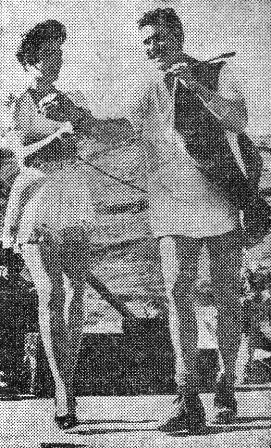 "FASHION PARADE" - Girls of USO troupe 269 playing to American and Chinese soldiers of the Chinese Combat
Command, west of the Salween River in southwest China, conducted a "fashion parade" with GI recruits from the
audience. To a howling audience, dancer Patricia Flynn presented Pfc. Harold Schultz of Woodside, N.Y., Schultz, it
is alleged, represents "Staff Sergeant Heavy Maintenance of 1945."
"FASHION PARADE" - Girls of USO troupe 269 playing to American and Chinese soldiers of the Chinese Combat
Command, west of the Salween River in southwest China, conducted a "fashion parade" with GI recruits from the
audience. To a howling audience, dancer Patricia Flynn presented Pfc. Harold Schultz of Woodside, N.Y., Schultz, it
is alleged, represents "Staff Sergeant Heavy Maintenance of 1945."
|
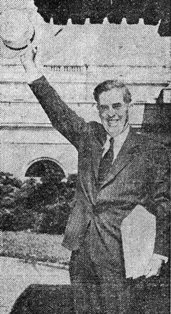 SECRETARY OF COMMERCE Henry A. Wallace, former Vice President of the United States, was sworn in March 2 as
Secretary of Commerce by Supreme Court Justice Hugo L. Black. Wallace's nomination to the Cabinet post by President
Roosevelt was confirmed March 1 by the Senate. He pledged the Department of Commerce to continue to play "a full part"
in the nation's war effort.
SECRETARY OF COMMERCE Henry A. Wallace, former Vice President of the United States, was sworn in March 2 as
Secretary of Commerce by Supreme Court Justice Hugo L. Black. Wallace's nomination to the Cabinet post by President
Roosevelt was confirmed March 1 by the Senate. He pledged the Department of Commerce to continue to play "a full part"
in the nation's war effort.
|
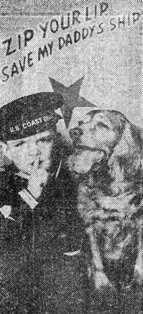 DEMONSTRATING sign above, Jay Twigg of Boston emphasizes silence concerning war maneuvers. His daddy, Lt. Edward
J. Twigg, is a doctor serving aboard a combat ship. Cocker spaniel agrees.
DEMONSTRATING sign above, Jay Twigg of Boston emphasizes silence concerning war maneuvers. His daddy, Lt. Edward
J. Twigg, is a doctor serving aboard a combat ship. Cocker spaniel agrees.
|
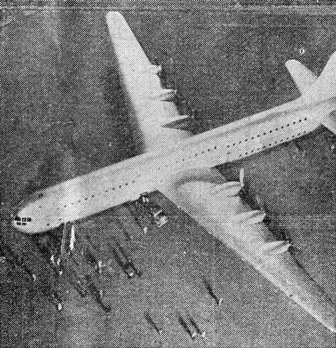 WORLD'S LARGEST transport, this Vultee plane will carry 204 passengers and 15,000 pounds of baggage, mail and
express. Streamlined clipper is 12 times the size of standard commercial aircraft, and is powered by six engines which
produce power equal to that of 353 automobiles. Plane is 182 feet long.
WORLD'S LARGEST transport, this Vultee plane will carry 204 passengers and 15,000 pounds of baggage, mail and
express. Streamlined clipper is 12 times the size of standard commercial aircraft, and is powered by six engines which
produce power equal to that of 353 automobiles. Plane is 182 feet long.
|
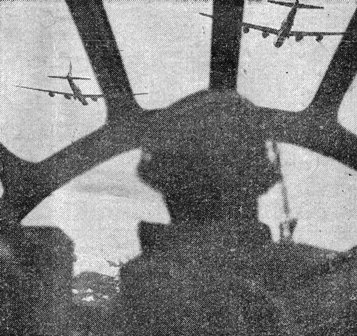 HIGH OVER MALAYA Two B-29 Superfortresses of Brig. Gen. Roger M. Ramey's XX Bomber Command are visible through
the nose of a third Superfort as the giant bombers begin a bombing run over the important railway yards and repair
shops utilized by the Japanese at Kuala Lumpur, north of Singapore. Bombs can be seen dropping from one of the planes.
The mission was carried out from India bases last month and crews reported good results.
HIGH OVER MALAYA Two B-29 Superfortresses of Brig. Gen. Roger M. Ramey's XX Bomber Command are visible through
the nose of a third Superfort as the giant bombers begin a bombing run over the important railway yards and repair
shops utilized by the Japanese at Kuala Lumpur, north of Singapore. Bombs can be seen dropping from one of the planes.
The mission was carried out from India bases last month and crews reported good results.
|
The CHINA LANTERN is the weekly newspaper of the United States Forces in the China Theater and is published by Lt. Lester H. Geiss, Editor-In-Chief, for military personnel only. T/Sgt. Harry Purcell, Managing Editor; Sgt. Maurice Pernod, Production Chief. Editorial offices: Hqrs., SOS, China Theater, Kunming, China, and Hqrs., SOS, Calcutta, India. Printed by Ajit Kumar Sinba at the "Amrita Bazar Patrika" Press.

MARCH 9, 1945
Adapted from the original issue of The China Lantern
Copyright © 2008 Carl Warren Weidenburner
ORDER OF THE DAY COMICS PAGE CROSSWORD PUZZLE
TOP OF PAGE PRINT THIS PAGE ABOUT THIS PAGE
SEND COMMENTS CLOSE THIS WINDOW
